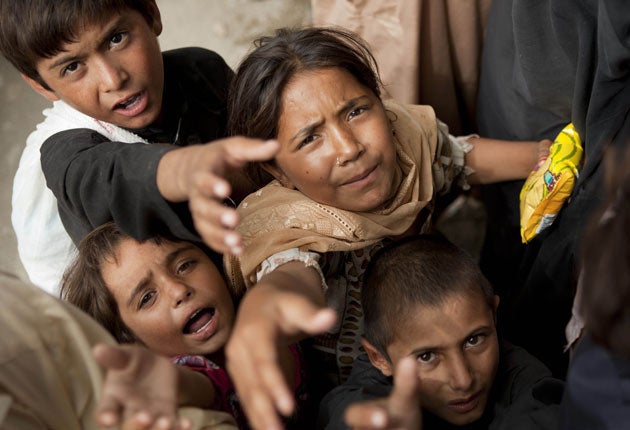Rescue teams struggle to reach 600,000 Pakistan flood victims

Record water levels were pressing down on a crucial flood barrier in Pakistan's Sindh province last night as monsoon rains showed no sign of easing – adding to the vast surge of water bearing down on towns and villages.
As officials said the amount of water coming down the Sukkur Barrage was already more than 150 per cent the maximum it was designed to withstand, the UN estimated that almost 14 million people were now feeling the impact of the floods. A UN spokesman, Maurizio Giuliano, told AP that, if so, the total affected would exceed the number hit by the 2004 Indian Ocean tsunami, the 2005 earthquake in Kashmir and the quake in Haiti combined.
So far, the death toll from the floods is around 1,500, but Pakistan's Prime Minister, Yousuf Gilani, said yesterday the disaster represented a bigger crisis than the 2005 Kashmir earthquake that killed nearly 80,000 people and the army's operation against the Taliban in the Swat Valley last spring that forced two million people from their homes.
"The magnitude of the tragedy is so immense that it is hard to assess," he said, while visiting the city of Multan. "Millions of people have suffered, and still there is more rain and further losses are feared. I appeal to the world to help us. We are doing what we can. The government has done everything possible but it is beyond our capacity – we are facing an extremely difficult situation."
Such comments will do little to ease the desperation of those caught up in the disaster, increasingly furious at what many consider a lacklustre response by the authorities. In particular, President Asif Ali Zardari, who is due to return to Pakistan imminently, has faced criticism for failing to postpone a foreign visit to help grapple with the humanitarian challenge created by the country's worst floods on record.
Even now, thousands of people remain stranded. Rescue workers said yesterday that they had still been unable to reach up to 600,000 people marooned in the Swat Valley, barely 100 miles from Islamabad, where aid groups are resorting to the use of donkeys to carry supplies. It is barely 15 months since hundreds of thousands of people fled the valley as troops moved in to oust Taliban fighters who had taken control of the former tourist haven.
Bad weather has grounded helicopters, among them US military choppers being flown on humanitarian missions. Elsewhere in the north-west, hillsides denuded of tree cover as a result of over-logging have started to slip and slide, triggering mud surges that have buried several dozen people.
While the high waters have started to recede in some parts of the north-west, the area worst struck by the flooding, elsewhere the crisis is deepening. In the provinces of Sindh and Punjab, hundreds of thousands of people have been evacuated. One aid group yesterday said that half of all the emergency camps set up by the authorities had now been abandoned because waters continued to rise. "Most people are now on the road," said Rashid Javed, of Plan International. "Around 50 per cent of camps are no longer safe. People have had to evacuate in [an] emergency; now more than 80 per cent of them are living outside camps, on roadsides, high ground, wherever they can. It's extremely dangerous and distressing for all."
Amid the huge, bewildering devastation faced by so many, activists have voiced concern for some of Pakistan's rarest wildlife. With so much water flooding down the Indus, the Sindh Wildlife Department and some NGOs have warned that endangered blind Indus dolphins could slip in to canals and feeder rivers, leading to fatalities.
India has asked the Pakistani army for help after around 30 of its soldiers deployed on the Line of Control in Indian-controlled Kashmir were swept away – possibly into Pakistan-administered Kashmir – by separate flooding that has killed more than 150 people and left several hundred missing.
Subscribe to Independent Premium to bookmark this article
Want to bookmark your favourite articles and stories to read or reference later? Start your Independent Premium subscription today.

Join our commenting forum
Join thought-provoking conversations, follow other Independent readers and see their replies